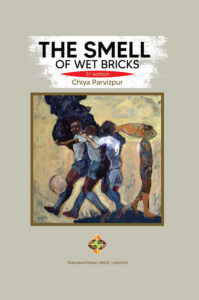 The Smell of Wet Bricks, 3rd Ed.
The Smell of Wet Bricks, 3rd Ed.
by Chia Parvizpur
Published: 18 January 2024 (First edition was published: 26 August 2018) [Fiction: 9]
Paperback: ISBN: 978-1-912997-64-0: Buy at Amazon | Buy from Lulu | Talebe.com’dan al
Digital: ISBN: 978-1-912997-73-2: Read on Kindle | Read on Google Play Books |Read on CEEOL | Talebe.com’da oku
“The Smell of Wet Bricks” stands as an innovative short novel written in English by a Kurdish author. Hailing from a region scarred by a century of violence and wars, this work, by the Iranian Kurdistan native Chiya Parvizpur, emerges as a fresh and distinctive voice. Parvizpur aspires to be the advocate for a rich reservoir of compelling narratives. Born in Sanandaj, a Kurdish writer and translator, Parvizpur expresses his creative prowess in both Kurdish and English. Devoted to translating the masterpieces of Kurdish novelists into English, he leverages his background in English Literature to focus on crafting fictional works. Drawing inspiration from his folk culture, myth, and history, Parvizpur endeavors to reveal the untold stories of the Kurdish homeland—narratives that would otherwise remain veiled and suppressed.
Excerpt:
“His life was not empty of excitement; never did he have a monotonous life, and, even now that his body is lying in a corner thereunder a tree, never will he be immune from menace. Wanderer, nomad, homeless, or whatever you may call him will not make a change in his path, since he is an emperor. Nothing else matters to him except for his mission. He is in thorough possession of freedom and, equally, emancipated from any kind of blameworthiness.”…
“The girl closes the notebook. She thinks about the day that she can go to Resho’s room to be exposed to his inspirations. She would smell the bricks of his room’s wall from which Resho detached its plasters to pour water on them. He loved the smell of wet bricks.”
About Author:
Chia Parvizpur is a Kurdish author born in Sanandaj, the Kurdistan of Iran. He plays Tamura and teaches English for a living. Having studied English Literature with the intention of writing creative works of fiction in English, he opts for reviving his folk culture, myth, and history. In this way, he desires to unearth erstwhile pangs that would otherwise remain veiled and repressed in the labyrinths of time and place.
